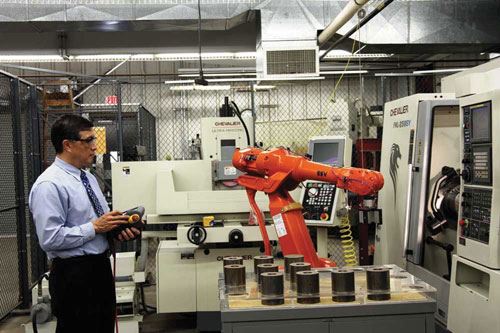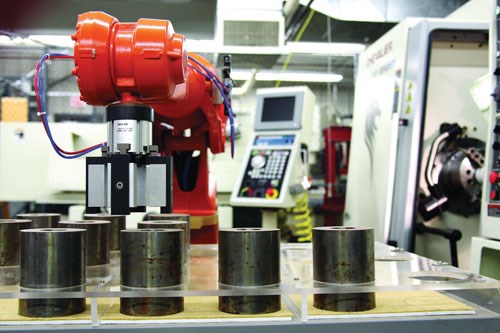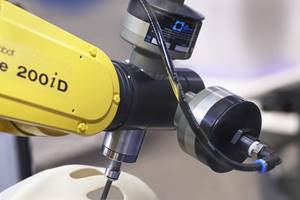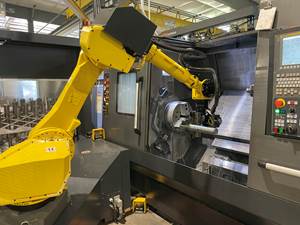Frank Chen, Ph.D., believes he knows the right prescription for keeping U.S. manufacturing ahead in today’s fast-changing global economy: innovation, education and investment. That might sound like a familiar tune, but for Dr. Chen, it isn’t just talk—his work at a manufacturing education and research center in San Antonio, Texas, involves taking concrete steps toward advancing this idea on a daily basis. One of his most valuable resources in those efforts is a two-machine cell consisting of a turn-mill and surface grinder from Chevalier Machinery (Santa Fe Springs, California), both of which are serviced by an industrial robot from ABB Robotics (Auburn Hills, Michigan). Since installation, the cell has proven capable, flexible and precise enough to take on virtually any required project, he says.
Dr. Chen is director of the University of Texas, San Antonio (UTSA) Center for Advanced Manufacturing and Lean Systems (CAMLS). CAMLS was founded in 2007 to provide education and training and to conduct research and development in support of a local manufacturing industry that has grown rapidly in recent years as companies like Caterpillar and Toyota joined the major aviation and defense suppliers, as well as hundreds of smaller shops that were already established in the region. Nonetheless, local employers often struggle to fill openings for mid- to high-paying jobs in critical manufacturing positions. These companies—especially the small- and medium-sized manufacturers—have urgent needs for training in advanced machining, lean manufacturing and integrated manufacturing systems, Dr. Chen says.
Enter the CAMLS, which relies on grant funding as well as support from members who pay an annual fee to pool assets or work alone with the organization’s staff to tackle difficult challenges, ideally for less than the cost of meeting the same goals in-house.Much of the consortium’s work is carried out in laboratories featuring a selection of computer-based modeling, simulation and analysis tools, various robots and precision measuring systems, and mostly table-top-scale machinery and equipment. While that is sufficient for educational purposes, organizers recognized early in the CAMLS’ development that helping manufacturers develop new capabilities and proficient machinists would require more. “We needed to supplement the ‘soft,’ lean-system side of our center’s strength with production-scale hardware that could provide industry training and small-lot experimental production capabilities,” Dr. Chen explains.
Any machinery would require high accuracy to handle some of the high-tech parts that are common in the local manufacturing sector. Automated equipment would also be preferable, considering machine-tending robots are the norm in the mid-volume, mid-variety production environments that characterize local biomedical instrument and aerospace component manufacturers, Dr. Chen says. Additionally, a range of capabilities would be required to handle a variety of geometries and materials. Given the CAMLS’ tight budget, typically low production quantities, and lack of access to an extensive machine shop, a multi-function turn-mill was considered the best option for meeting all of these goals. The organization determined it would also need a surface grinder for finishing operations, as well as an industrial robot for automated loading/unloading on both machines.
As a supplier of both types of machines that has the engineering capability required to integrate third-party robotics, Chevalier Machinery became the builder of choice. Working with ABB robotics specialists, the company took full responsibility for installation, integration and training for all of the new equipment: an FNY-250SY turn-mill, an Ultra H612 CNC surface grinder and an ABB irb 2400 industrial robot.
Although much of the center’s work with industry partners is proprietary, Dr. Chen says applications of the machining cell tend to involve attempts to develop new machining processes and/or reduce setup time and total processing time. For that, the capabilities of the FNY-250SY turn-mill are invaluable, he says. Featuring a subspindle as well as C-axis functionality and a Y-axis turret that enable off-centerline milling, the machine can meet required tolerances on even the most complex-geometry parts in a single chucking.
As for the grinder, features such as a pyramid-shaped machine base, extra-long spindle-seat guideways, and a heat-treated, GB300 Meehanite cast iron structure provide the rigidity required for high-quality surface finishes. Likewise, various features promote accuracy, including cooling systems that reduce thermal distortion, Turcite-B coating on all guideways, and optical scales for pitch-error compensation.
“When local manufacturers visit us, we give them a tour of our facilities. If they’re into machining, the last thing we show them is the Chevalier machining cell. That way they know we’re serious when we talk high-performance manufacturing,” Dr. Chen concludes.




























.jpg;maxWidth=300;quality=90)









